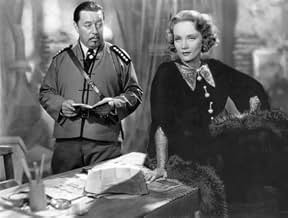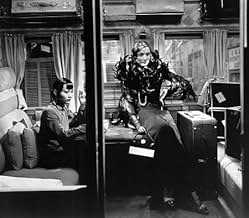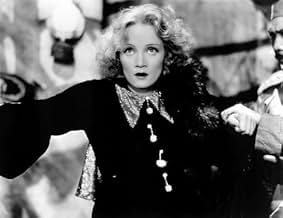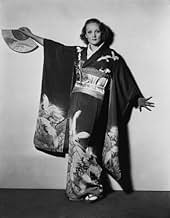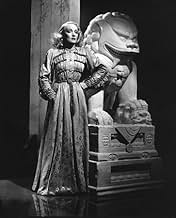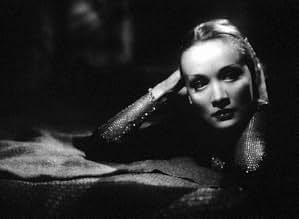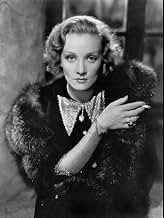A notorious woman rides a train through a dangerous situation with a British captain she loved.A notorious woman rides a train through a dangerous situation with a British captain she loved.A notorious woman rides a train through a dangerous situation with a British captain she loved.
- Director
- Writers
- Stars
- Won 1 Oscar
- 2 wins & 2 nominations total
- Dr. Professor Jack
- (uncredited)
- Minor Role
- (uncredited)
- Carey
- (uncredited)
- Chinese Soldier
- (uncredited)
- Chinese Officer Checking Passports
- (uncredited)
- British Officer at Shanghai
- (uncredited)
- British Railway Officer
- (uncredited)
- Undetermined Secondary Role
- (uncredited)
- Train Engineer
- (uncredited)
- Director
- Writers
- All cast & crew
- Production, box office & more at IMDbPro
Featured reviews
Despite the fact that the entire film is produced in either a Hollywood lot or a train depot in San Bernardino, I feel that I am in China during very turbulent and dangerous times. Thanks to the special skills of director Josef von Sternberg, the prevailing sense of impending peril is very strong. Warner Oland, although not even half Chinese, is very convincing as the menacing rebel leader. The rest of the cast is excellent as well. Both Dietrich and Brook project an outward appearance of stiffness and toughness to the dangerous world around them, but we learn along the hazardous and uncertain journey that their exterior façade is nothing but a thin disguise, and there lies a very vulnerable humanity deep within both of them. Dietrich gives another one of her many fascinating performances, full of psychological complexity. I love her.
I don't understand all of the harsh criticism of Clive Brook among the user reviews here that he is too wooden and mechanical. That is exactly the way he was supposed to play the role of a military doctor living in a world full of danger and of extreme hostility that is specifically aimed at him and his uniform. If we watch him closely, we will observe the decent, compassionate man behind the uniform. I thought that Dietrich and Brook make a smashing couple, especially when their outward and superficial veneer crumbles before our very eyes. This is good stuff!
The beautiful and mysterious Ana May Wong also provides complexity and depth to her deceiving, outward impression as Lily's courtesan companion, Hui Fei. Again, we must not judge Hui Fei based on her exterior demeanor alone because deep within her lies a very brave and determined dedication to her country and to her society. Her exchanges with Mrs. Hegarty (Louise Closser Hale), the prim and proper boarding house owner, are most entertaining. I'm usually not focused on hairdos, but check these out, especially Hegarty's. Holy mackerel.
As you will see, none of the characters are what they seem to be at first glance. That is only part of what intrigues me about this movie. Please don't miss this extraordinary train, which only leaves the station on rare occasions. If you don't appreciate the ride as much as I do, you can always get off when the next cow decides to wander into its path but, considering the danger lurking in every direction, you will probably be safer on it than off it. Be forewarned and sit tight until the end. You won't be disappointed.
Leaving for Shanghai to operate on the stricken British Consul-General, army physician Clive Brook climbs aboard only to find the woman he loved but lost five years ago (Dietrich). Now, however, she goes by another appellation; as she explains, in the script's most emblematic line, `It took more than one man to change my name to Shanghai Lily.' Her presence on the train, and that of one of her sisters-in-sin (Anna May Wong) is cause for scandal and indignation among the other passengers: prim boarding-house proprietress Louise Closser Hale (with her pooch Waffles smuggled on board); sputtering man of the cloth Lawrence Grant; sardonic gambling man Eugene Pallette; a Frenchman; a German; and the inscrutable, pre-Charlie Chan Warner Oland.
Soon, China being embroiled in a civil war, they have more to worry about than Dietrich's morals. Rebel troops halt the journey lead the passengers, one by one, to be interrogated by their warlord, who turns out to be Oland. The various eccentricities, secrets and agendas of the passengers get brought into the open, affording Oland opportunity to avenge any number of racial and personal slights. But finally he finds what he's been looking for a valuable hostage to serve as a bargaining chip in Brook. And from then on Shanghai Express becomes a drama of reckoning, with all the characters scheming to save their own (and occasionally one anothers') skins.
None of the players can be faulted, except for Brook, who gives a dead-earnest impersonation of the stick that stirs the fire; that Dietrich should have fallen for him is like believing several impossible things before breakfast. (Cary Grant was around in 1932; too bad Sternberg didn't catch up with him until his next movie, Blonde Venus.) But in his handling of Dietrich, Sternberg all but patents what came to be called star treatment. Stunningly lighted, her feline face is caught in a breathtaking range of moods and attitudes. But she's more than a passive vessel for the director's intentions her blend of worldly savvy and steely spine is hers and hers alone.
She isn't the only beneficiary of Sternberg's eye. He shoots the movie in a haunting, intense chiaroscuro (few movies from this early in the 1930s were so richly and handsomely photographed). He cuts from scene to scene teasingly, layering new shots on fading images, adding a little rubato to relate incidents of the story to one another. Shanghai Express may be the first masterpiece of the sound era, one that's still no less extraordinary today than it was 70 years ago.
"Shanghai Express" is a great Pre-Code Film with magnificent performances of the gorgeous Marlene Dietrich and Anna May Wong. The melodramatic romance about the lack of faith in love and the recounter of two former lovers in the environment of the Chinese Civil War in 1931 is engaging with wonderful black and white cinematography. Marlene Dietrich deserved a better romantic pair since the wooden Clive Brook does not have good performance. My vote is seven.
Title (Brazil): "O Expresso de Shanghai" ("The Shanghai Express")
Set in Kuomintang China, the film concentrates on a group of train passengers making a journey from Peking to Shanghai. These are the white passengers all heading for their extraterritorial enclaves on the China coast and a couple of richer Chinese. One of them is Warner Oland who is a seemingly respectable Chinese merchant, but actually a notorious warlord leader a group that Chiang Kai-Shek has sworn to exterminate. In fact during this period his government was doing just that.
Oland is best known for playing Chinese detective Charlie Chan, but he's not dispensing fortune cookie wisdom here. He's a most menacing figure who when he's revealed holds all the lives of the passengers in his hands. The other Oriental in this group is well to do prostitute Anna May Wong. She and Dietrich find themselves kindred spirits and are shunned by the other passengers.
It's a reunion of sorts for Dietrich, another of the passengers is Clive Brook a British army doctor who is on his way to China to perform a delicate operation on a big shot. He and Dietrich were once involved, but when he dumped her, she took the road that made her the notorious Shanghai Lily.
The main weakness of Shanghai Express in fact is Brook. He's such a cold fish drip of a man, I can't see how Dietrich and he could ever have been involved. The film would work a lot better if the role had been cast with someone of Douglas Fairbanks, Jr's charm. Still Brook proves the old flame hasn't quite died down and in fact it hasn't for Marlene either.
Other characters on the train are Lawrence Grant as a reverend Davidson type missionary, Louise Closser Hale as an old American dowager, Emile Chautard as a disgraced French Army officer, Gustave Von Seyfertitz as a hypocritical opium dealer, and Eugene Palette as a crass American businessman as only Eugene Palette can play them. They provide quite a cross section of the western powers who were nibbling on the Chinese body politic at the time.
Shanghai Express won an Oscar for Cinematography and was in the running for Best Picture that year, losing to Grand Hotel which has a lot of similarities to this film. Dietrich is unforgettable as Shanghai Lily and this is a must for her fans.
Did you know
- TriviaThe extras in the film mostly speak Cantonese - a Chinese dialect used mainly in southern China. If the film were to be more accurate, the extras would speak Mandarin, but most Chinese residents in the Los Angeles area (who worked as film extras) spoke Cantonese, necessitating Josef von Sternberg use Cantonese. Even so, Cantonese was spoken by a lot of Chinese as Mandarin gradually gained ground.
- GoofsThe film is set in northern China (Peking to Shanghai). The government and warlord soldiers are speaking Taishanese, which is a southern Chinese dialect not generally spoken in northern China. The northern dialects of Mandarin Chinese (a Beijing dialect) and/or Shanghainese would be spoken instead.
- Quotes
Mr. Henry Chang: All the money in the world can't wipe out his insult to me.
[Shanghai Lily tries to shoot him]
Mr. Henry Chang: You only had my interest before. Now you have my admiration. I could love a woman like you.
Shanghai Lily: You made me an offer to leave with you. Does it still hold good?
Mr. Henry Chang: I wouldn't trust you from here to the door. What assurance have I you won't trick me?
Shanghai Lily: I give you my word of honor.
Mr. Henry Chang: A man is a fool to trust any woman, but I believe a word of honor would mean something to you.
- Alternate versionsComments in the AFI Catalogue suggest the credits were changed when re-released in 1935. According to the Catalogue, the original print referred to Harry Herveys work as a novel. In the viewed print on TCM, the onscreen credit was "story." The print was clearly a re-released print because of the PCA certificate number listed onscreen; such numbers were not issued until 1934. It is not known what other changes were made, if any, but the print ran only 82 minutes, suggesting some additional editing had been done.
- ConnectionsFeatured in Without Regret (1935)
- How long is Shanghai Express?Powered by Alexa
Details
- Release date
- Country of origin
- Languages
- Also known as
- El expreso de Shanghai
- Filming locations
- Production company
- See more company credits at IMDbPro
- Runtime1 hour 22 minutes
- Color
- Aspect ratio
- 1.37 : 1
Contribute to this page


